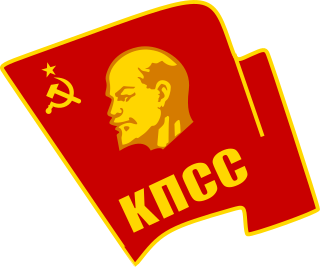
The Communist Party of the Soviet Union (CPSU), at some points known as the Russian Communist Party, All-Union Communist Party and Bolshevik Party, and sometimes referred to as the Soviet Communist Party (SCP), was the founding and ruling political party of the Soviet Union. The CPSU was the sole governing party of the Soviet Union until 1990 when the Congress of People's Deputies modified Article 6 of the 1977 Soviet Constitution, which had previously granted the CPSU a monopoly over the political system. The party's main ideology was Marxism–Leninism. The party was outlawed under Russian President Boris Yeltsin's decree on 6 November 1991, citing the 1991 Soviet coup attempt as a reason.
The organization of the Communist Party of the Soviet Union was based on the principles of democratic centralism.

Leonid Ilyich Brezhnev was a Soviet politician who served as General Secretary of the Communist Party of the Soviet Union from 1964 until his death in 1982, and Chairman of the Presidium of the Supreme Soviet from 1960 to 1964 and again from 1977 to 1982. His 18-year term as General Secretary was second only to Joseph Stalin's in duration.

The Kazakh Soviet Socialist Republic, also known as Soviet Kazakhstan, the Kazakh SSR, KaSSR, or simply Kazakhstan, was one of the transcontinental constituent republics of the Soviet Union (USSR) from 1936 to 1991. Located in northern Central Asia, it was created on 5 December 1936 from the Kazakh ASSR, an autonomous republic of the Russian SFSR.

The Tuvan People's Republic (TPR), known simply as Tannu Tuva, was a partially recognized socialist republic that existed between 1921 and 1944. The former country was located in the same territory as the former Tuvan protectorate of Imperial Russia, known as Uriankhai Krai, northwest of Mongolia, and now corresponds to the Tuva Republic within the Russian Federation.
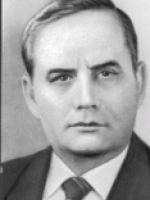
Vladimir Antonovich Ivashko was a Soviet Ukrainian politician, briefly acting as General Secretary of the Communist Party of the Soviet Union (CPSU) during the period from 24 to 29 August 1991. On 24 August Mikhail Gorbachev resigned from the post, and on 29 August the CPSU was suspended by the Supreme Soviet. Before becoming General Secretary he had been voted Gorbachev's Deputy General Secretary within the Party on 12 July 1990, a newly created position as a result of the 28th Congress of the Communist Party.
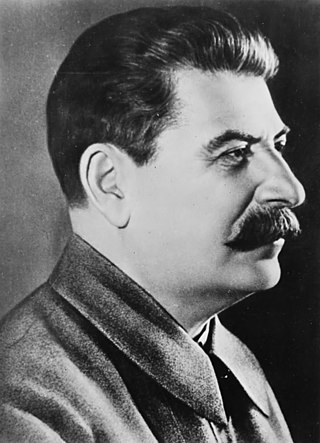
The general secretary of the Central Committee of the Communist Party of the Soviet Union was the leader of the Communist Party of the Soviet Union (CPSU). From 1924 until the country's dissolution in 1991, the officeholder was the recognized leader of the Soviet Union. Prior to Joseph Stalin's accession, the position was not viewed as an important role in Vladimir Lenin's government and previous occupants had been responsible for technical rather than political decisions.

The president of the Soviet Union, officially the president of the Union of Soviet Socialist Republics, abbreviated as president of the USSR, was the head of state of the Union of Soviet Socialist Republics from 15 March 1990 to 25 December 1991.

The Secretariat of the Central Committee of the Communist Party of the Soviet Union (CPSU) was responsible for managing and directing the day-to-day operations of the Communist Party of the Soviet Union, while the Politburo was charged with the policy-making aspects of the party. The Secretariat was a component agency of the party's Central Committee.
Semyon Denisovich Ignatiev was a Soviet politician, and the last head of the security forces appointed by Joseph Stalin.
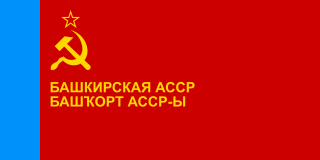
The Bashkir Autonomous Soviet Socialist Republic, also historically known as Soviet Bashkiria or simply Bashkiria, was an autonomous republic of the Russian SFSR. Currently it is known as Republic of Bashkortostan, a federal subject of Russia. The Bashkir ASSR was the first Autonomous Soviet Socialist Republic in the RSFSR.
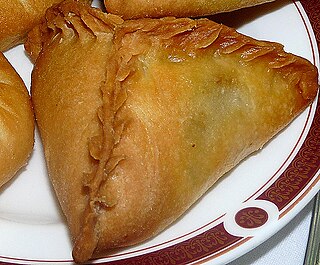
Uchpochmak is a Tatar and Bashkir national dish, an essential food in Tatar and Bashkir culture. It is a triangular pastry, filled with chopped meat, onion and potatoes. Uchpuchmak is usually eaten with bouillon or with tea.

The flag of the Republic of Bashkortostan is one of the official state symbols of Bashkortostan, a federal subject of Russia, alongside the coat of arms and anthem. The flag has three horizontal stripes. From top to bottom, the stripes are teal blue, white, and green. The flag has been used officially as the flag of the Republic of Bashkortostan since 25 February 1992. The white stripe of the flag is charged with a kurai flower in the center.

The Russian Soviet Federative Socialist Republic, previously known as the Russian Soviet Republic and the Russian Socialist Federative Soviet Republic, and unofficially as Soviet Russia, was an independent federal socialist state from 1917 to 1922, and afterwards the largest and most populous constituent republic of the Soviet Union (USSR) from 1922 to 1991, until becoming a sovereign part of the Soviet Union with priority of Russian laws over Union-level legislation in 1990 and 1991, the last two years of the existence of the USSR. The Russian SFSR was composed of sixteen smaller constituent units of autonomous republics, five autonomous oblasts, ten autonomous okrugs, six krais and forty oblasts. Russians formed the largest ethnic group. The capital of the Russian SFSR and the USSR as a whole was Moscow and the other major urban centers included Leningrad, Stalingrad, Novosibirsk, Sverdlovsk, Gorky and Kuybyshev. It was the first socialist state in history.
Tagir Taipovich Kusimov was a Soviet military leader of Bashkir origin.
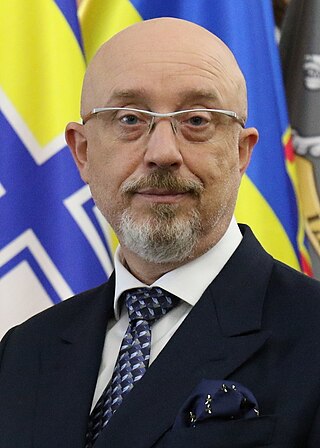
Oleksii Yuriiovych Reznikov is a Ukrainian lawyer and politician who served as the Minister of Defence of Ukraine from 4 November 2021 until his dismissal on 5 September 2023. Reznikov previously has served in several other positions in the government of Ukraine: Deputy Prime Minister, Minister for Reintegration of the Temporarily Occupied Territories of Ukraine, deputy head of the Kyiv City State Administration from 2016 to 2018, and deputy mayor-secretary of the Kyiv City Council from June 2014 to December 2015.

Shagit Hudayberdin was a Bashkir revolutionary active in the Russian Revolution. From 23 November 1921 to March 1922 he was the Responsible Secretary of the Bashkir Regional Committee of the All-Union Communist Party (Bolsheviks).
Roza Sabiryanovna Akkuchukova was a Russian and Bashkir pop singer. She started singing in 1973 and became the Director of the Bashkir State Philharmonic Society in 1997. In 2009, she was honored as a People's Artist of the Republic of Bashkortostan.
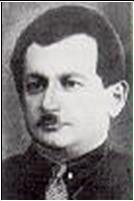
Yakov Borisovich Bykin was the 1st Secretary of the Bashkir Regional Committee of the All–Union Communist Party (Bolsheviks).